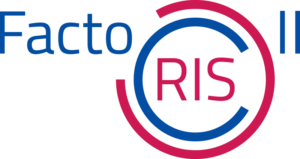| Project name: | Learning Factories for Digital Transformation of SMEs |
| ID code: | 22247 |
| Co-funded by: | EIT Manufacturing – European Union |
| Project website: | www.factoris.digital |
| Project duration: | 01/2022 – 12/2022 |
| Budget: | Total budget: 250.000 EUR Budget CTU: 36.000 EUR |
| Principal investigator at CIIRC: | Petr Kolář |
| Coordinator: | STUBA – Slovak University of Technology in Bratislava |
| Project Partners: | CIIRC CTU in Prague FEUP – Faculty of Engineering of the University of Porto, DIGI2 – Digital and Intelligent industry Lab, Portugal ART-ER – Attractiveness Research Territory, Italy UniMORE – University of Modena and Reggio Emilia, Italy IIC – Industry Innovation Cluster, Slovakia TU Wien – Technische Universität Wien / Vienna University of Technology |
Annotation:
The FactoRIS Project (“Learning Factories for Digital Transformation of SMEs”) is supported by EIT Manufacturing within the EIT Regional Innovation Scheme. This project has received funding from the European Union’s EIT Manufacturing programme.
FactoRIS’s main goal is to support the case-specific digital transformation of RIS based manufacturing SMEs by evolving existing production facilities towards Industry 4.0. and the uptake of advanced technologies.
Based on an extensive survey of challenges and needs of industry stakeholders, a set of learning factory projects is being implemented to provide them with dedicated digital learning content as well as hands-on experience, while considering their existing production infrastructure.
By stimulating creative thinking and problem-based decision making, the trainees (current and future employees) will upgrade their mindsets and skills, ultimately boosting the momentum of SMEs to transform their company into a next-generation factory with more competitive, smarter and sustainable production.
FactoRIS II aims to strengthen these objectives by:
- Further evolving existing production facilities towards I4.0 and fostering collaboration between manufacturers and their suppliers within innovative manufacturing ecosystems;
- Employing hybrid (physical and digital) learning factories to address technological and organisational aspects of the digital transformation of SMEs;
- Developing and expanding the network of partner learning factories in RIS countries.



